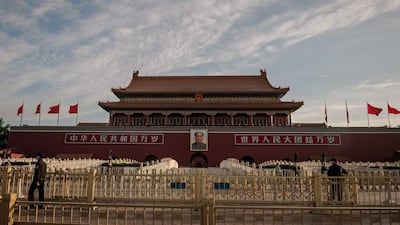China’s National People’s Congress, which was scheduled for March but delayed by the coronavirus, opened on Friday for a week and is expected to announce the direction of policy for the year.
The country is facing two major shocks: the pandemic, and the escalating trade and political confrontation with the US.
By far the world’s largest energy consumer and importer, China’s decisions will have a huge impact on its suppliers and the environment.
The economy is facing its worst year since Deng Xiaoping, who led China after the death of chairman Mao Zedong, began reforms in the late 1970s.
After output dropped 6.8 per cent in the first quarter, Premier Li Keqiang avoided setting a quantitative target for growth this year, given the continuing uncertainties.
The stimulus package he announced is so far less aggressive than expected, and smaller than that tabled after the 2008 global financial crisis, indicating government concerns about escalating debt.
Oil prices, which had been mounting a comeback, dipped 4 per cent on the lack of strong Chinese action.
Instead of iron and concrete, bricks and mortar, the new stimulus focuses more on digital infrastructure, data centres, artificial intelligence and the “Internet of Things”.
The energy and transport sections concentrate on advanced areas such as ultra-high voltage electricity transmission and more high-speed rail.
However, the announcement avoids a specific target for energy efficiency improvement. The priority seems clear: economic recovery without excessive financial strain. Environmental gains will be pursued where this can be done cheaply.
This stimulus probably will not resemble that of 2009, weighted towards construction and heavy industry, but it will not be China’s Green New Deal either.
China does have many opportunities for greener growth. With gas at record low prices and in surplus, it can accelerate again its replacement of coal in home heating and industry.
A major reform came in December, when it formed a national gas pipeline company, which should give smaller suppliers more access to markets.
A more electrified economy should need new generation from gas, nuclear and – especially – renewables, along with grid extensions.
China is trying to make its domestic solar photovoltaic market self-sustaining, without subsidies.
Plans from the Communist Party’s central committee to develop the western region mention wind, solar, and long-distance electricity transmission to the populous east.
However, they put more emphasis on new mines and transportation routes for coal.
On the international stage, president Xi Jinping’s signature Belt and Road Initiative has been criticised for building too much coal and environmentally destructive hydroelectric projects.
It faces further challenges as many of the partner countries will struggle to repay project debt because of the pandemic. Ideas for a more open and greener BRI, heralded last April, have yet to show many concrete results.
China’s State Grid Corporation, the world’s largest utility, has pioneered long-distance ultra-high voltage transmission, and has ambitious plans to create continent-spanning interconnections.
These face many practical and political problems. But the country’s international energy approach includes dominating manufacturing in new and emerging industries, such as solar panels and electric vehicles, and setting the rules of the game.
In this, it has moved ahead of America, which has denigrated multilateral institutions, focused on exporting bulk commodities instead of high-tech goods, and turned towards crudely mercantile managed trade.
Under Beijing’s phase one trade deal with Washington, it committed to increase purchases of US energy by $19 billion (Dh70bn) in 2020 and $34bn in 2021. This was already not feasible before the pandemic.
Afterwards, it has become triply so because of the collapse and partial recovery in China’s own energy demand, the slump in oil and gas prices and drying US oil exports as America's high-cost shale production falls.
As hostility between the two powers grows, it is even less likely that Beijing will rely for most of its energy needs on the US rather than on long-term reliable partners in Russia, central Asia and the Arabian Gulf.
The Covid-19 pandemic has made the centrality of China to energy markets even clearer. Though hit hardest at first, it is now one of the few bright spots for oil demand, vindicating the focus of the main Gulf national oil companies on it over the past few years.
This may eventually present Middle Eastern states with some tough choices. The US unsuccessfully tried to pressure European countries into not buying Chinese giant Huawei’s 5G network technology, over security fears.
It has asked Israel to review a Hong Kong company’s bid to construct a desalination plant.
China has increasingly invested in Middle Eastern energy assets in recent years, while US companies have stepped back. Its state companies are collectively the leading player in oil production in Iraq, it is the only remaining paying customer for Iranian crude and shares in one of Saudi Arabia’s largest refineries.
Jinko Solar built the Noor Abu Dhabi photovoltaic plant and Harbin Electric is a partner in the construction of Dubai’s Hassyan coal station. Other Chinese companies have taken stakes in several of Adnoc’s oil concessions since 2014.
Such investments are vital in cementing trade links and will be even more welcome in a post-pandemic Middle East when cash will be short.
However, the US will be wary if it thinks Beijing is growing too influential in the Middle East, if financially troubled countries look to China for bailouts or if particular projects trigger security warnings.
The direction of China’s post-pandemic energy economy, at home and abroad, is crucial.
Solid growth with a greener turn would be very welcome. States need to watch where the congress points and understand how they can safely deepen their engagement.
Robin Mills is chief executive of Qamar Energy, and author of The Myth of the Oil Crisis


